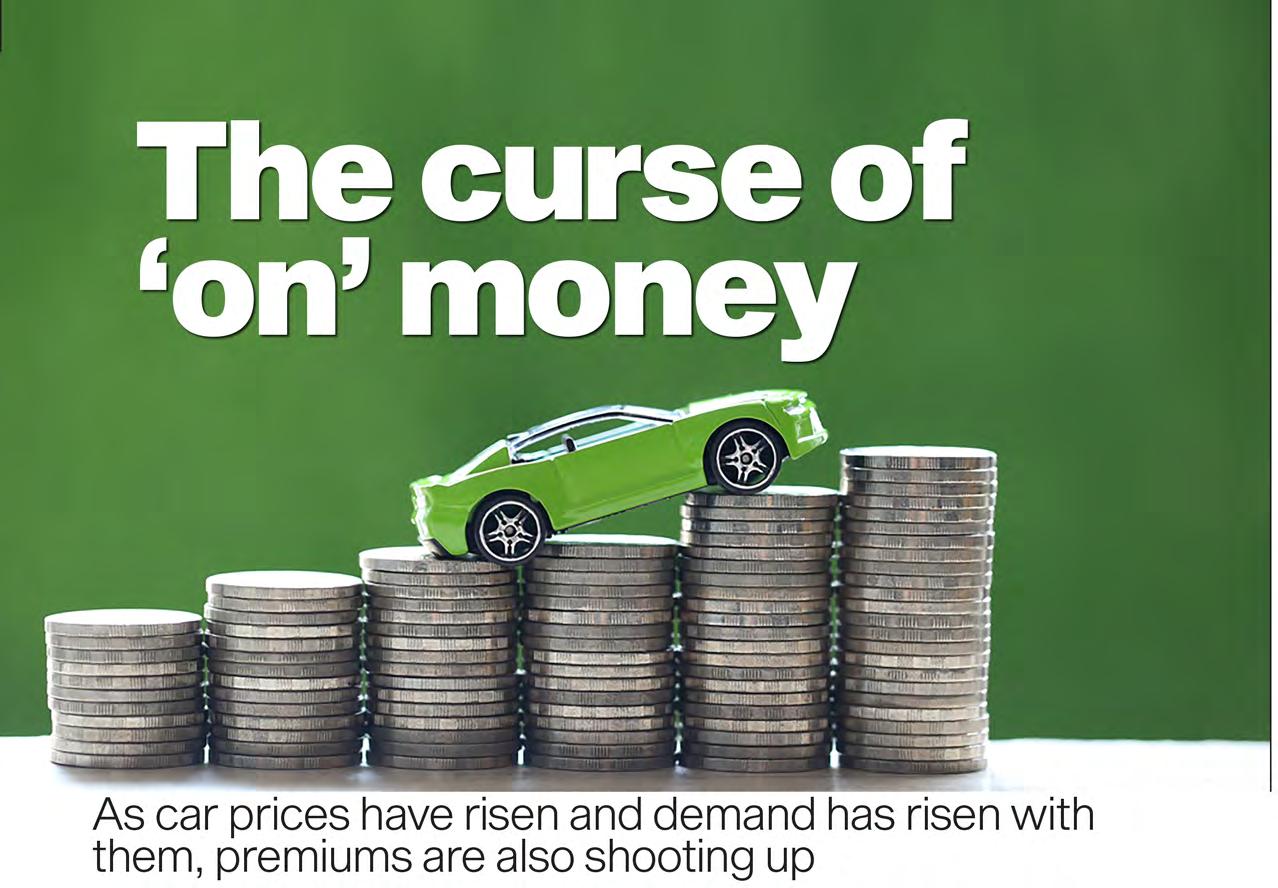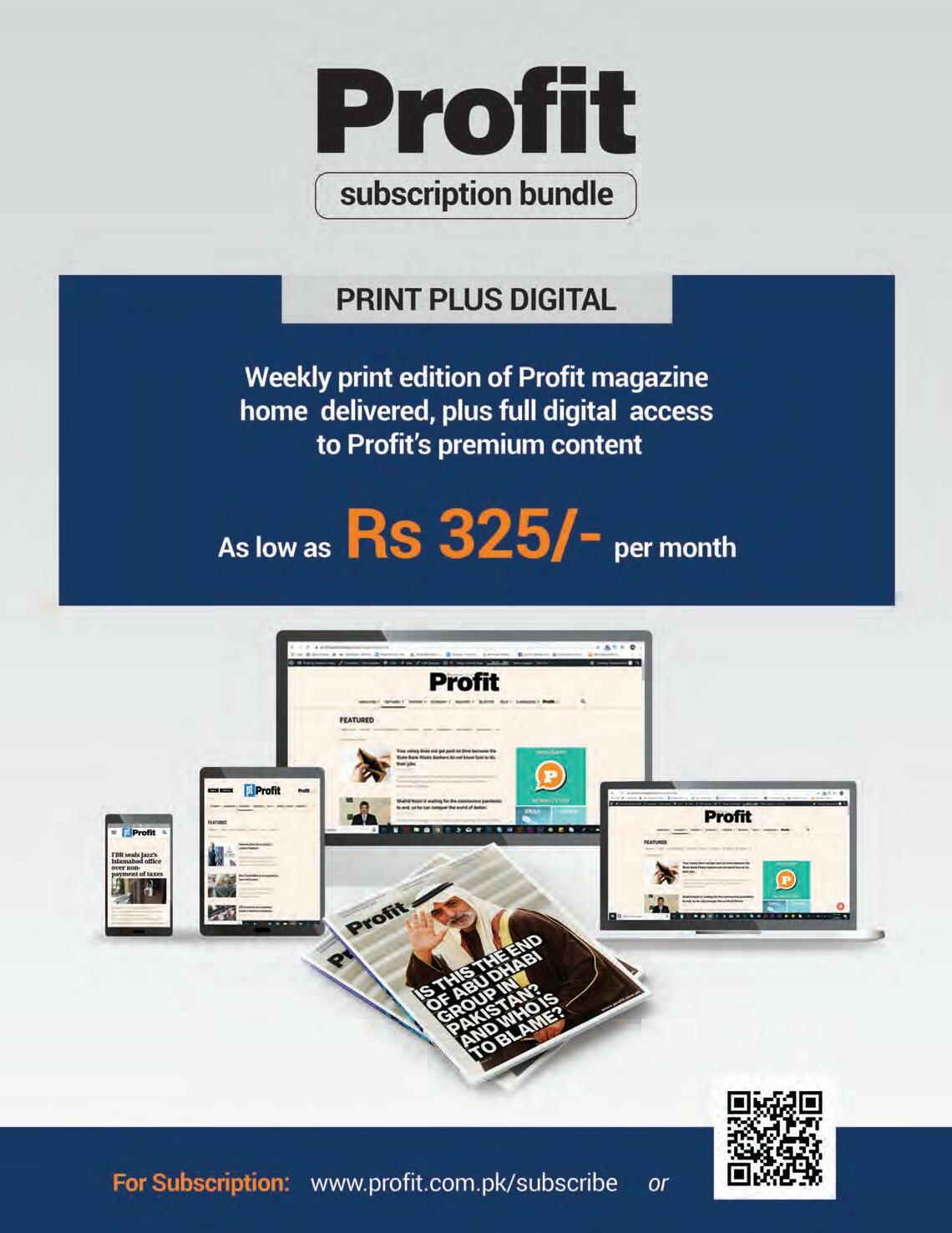
8 minute read
The curse of ‘on’ money
By Shahab Omer
Anyone that has ever bought a car in Pakistan knows the struggle of what is colloquially known as the ‘on’ price. This is the extra money that a person has to pay to buy a car and drive it home straight away without months of waiting.
Advertisement
Why this exists is a long and complicated story. In essence, it is car dealerships that book a large number of vehicles and then prey on the weak supply chain of auto assemblers in the country to hike up prices and make massive profits. It is essentially paying a premium just to have timely delivery. In the past month, even as Toyota, KIA, and others have raised their prices and more cars than ever have entered the market ‘on’ prices have risen. However, with the diversification of Pakistan’s car market and the emergence of new categories like the crossover SUV, will the trend of on prices continue, or is there a change in the offing?
The state of the industry
Despite the depreciation of the rupee and persistent inflation in Pakistan, the last few months have seen a marked increase in production and sales of new vehicles. According to the data released by Pakistan Automotive Manufacturers Association (PAMA), during the first eight months of the current fiscal year, the sales of vehicles has increased 57.7%, trucks 82.2%, jeeps / pickups 51.5% and farm tractors 6%. According to the same data, vehicle sales in the first eight months of the current fiscal year increased to 149,813 units from 95,139 units in the previous fiscal year. One of the major reasons for this is the culture of ‘on-money or premium money’ in the automotive sector of Pakistan even today. When the new auto policy was introduced by the government, it was claimed that the policy would help eradicate premium money culture and in order to eradicate the culture in the policy, an additional tax of RS 50,000 to RS 200,000 was levied on vehicle registration.
For example, if a vehicle is booked in someone else’s name and the vehicle will be registered in someone else’s name at the time of delivery so, depending on the CC of the vehicle, additional tax of RS 50,000 to RS200,000 has to be paid. Under the policy, car manufacturers are required to deliver the vehicle within 60 days of booking, otherwise the company will be bound to pay the customer 3 percent interest per day with Kibor to the customer. Profit visited various dealerships of different brands of vehicles and, interestingly, all the popular vehicles in the market were either booked off or asked to wait four to eight months. Vehicles were booked on certain days of the month at Suzuki Shalimar Motors in Lahore whereas booking of the new Civic was stopped by Honda’s dealership in Township while the delivery time for the said vehicle was eight months. However, for the 1500cc and 1200cc variants of the Honda City, the time of delivery was to be four months. Similarly, Babar Abbas, sales manager of Toyota’s dealership on Walton Road, informed
this scribe that bookings were being made for Toyota Yaris and Altis. “However, Yaris will be delivered in June while Altis will be delivered in September. Both vehicles can be booked on the same CNIC whereas booking of vehicles will be done at the rate of RS 10 million per vehicle instead of full payment,” he said. Despite the insistence of Profit, the salesman refused to deliver the vehicle before time and said that now the system is online and he could not deliver the vehicle before time which means he doesn’t even have a car available on on-money.
The same was true of Honda’s dealerships in DHA Lahore, with eight months for the newly introduced Civic and four months for the Honda City. Now if dealerships are not selling cars on premium money, then who is selling these cars in the market? Muhammad Waheed of Amjad Motors, located on Jail Road, gives the answer that in fact these vehicles are now being sold only to acquaintances by paying premium money or investors are selling these vehicles.
“There are actually two types of new cars on the market. The first type is an open invoice vehicle owned by dealership companies. Each dealership has a specific quota and the company will provide more vehicles under the quota to the dealership which has more security deposit. The other car is in the investor’s name. The current situation is that if you buy a car with a dealership i.e. an open invoice car then you will not have to pay any additional tax on it but it is very difficult to get such a car from dealership. However, you will see these vehicles in different showrooms of the city and these showroom owners are either friends of the dealership or good acquaintances and the same showroom owners will receive premium money on these cars. Similarly, if you buy an investor’s car, in addition to the premium money, you will have to pay an additional Rs 100,000 to the government on registration. The dealership will no longer demand premium money as doing so risks canceling their dealership,” he said. Waheed further informed that at present only Honda City 1500 cc and Changan’s Alsvin are not being charged premium money in the city as their demand is almost non-existent. “My network is all over Punjab and all over Punjab, premium money of Rs 300,000 to Rs 400,000 is being demanded on the newly introduced Suzuki Swift at present. Similarly, premium money ranging from RS 700,000 to RS 1.2 million is being demanded on Honda’s newly introduced Civic. Toyota has increased the price of the vehicles but despite this, a premium of RS 300,000 is being demanded on the old invoiced Yarisand 500,000 on Altis while premium money of RS 200,000 is being demanded on new invoice Yaris and RS 300,000 on Altis,” he added.
The new entrants
According to Waheed, the investors in the market were demanding RS 1.2 million premium money on Toyota’s Legender while RS 400,000 premium money was being demanded on KIA Stonic. “Demand for Changan’s Alsvin, Proton Saga, MG has come down a lot in the market. People who visit our showrooms don’t even ask for the price of these cars, so how can we ask for premium money. The situation is that if you want to buy a car without paying premium money, first of all you will get the car after four to eight months and if you want to buy a car without paying extra tax on premium money, you will not get an open invoice car, you will have to buy a car from an investor, so those who trade in premium money have a profit in any case,” he added. A senior official of a Toyota dealership in Sialkot told Profit that every year when the government starts making decisions in the budget regarding the import of used cars, the car assembling companies in Pakistan give the same impression to the government that they are ready to deliver cars immediately, but in practice this does not happen. “Even today, cars are not being sold in the market without premium money. The government has taken some steps to eradicate this culture but those are not enough. Investors consider the on-money business a safe business. In this business, first of all let’s talk about the profit of the dealership. When the dealership orders a car from the company, it first displays the car on an open invoice in some other showroom of any acquaintance. The car is not sold at the dealership but at some other showroom and thus the showroom owner pays 60% of the premium money to the dealership. The whole deal is either done by the sales manager stationed at the dealership or the dealership owner is in direct contact with the various showrooms that is why dealerships do not have their quota car available,” he said.
The official further informed that the vehicles of investors are also being booked by the sales managers of the dealership. “Normally,
Company Car name Variant Own Toyota Corolla Altis Grande’ top 1.5-2 lac of the line 1.8L Toyota Corolla Altis X 2-3 lac autonomatic 1.6L Toyota Yaris AIV X CVT 1.5L zero to 50k Toyota Hilux Rocco 1.1 - 1.2 million Toyota Hilux Legender 1.3 - 1.4 million (even sold for 2.7m own) Suzuki Alto VXL 2.5-3 lac Suzuki Alto VXR 1.5-2 lac Suzuki Cultus VXL 2-2.5 lac Suzuki Cultus VXR 2.2.5 lac Suzuki Swift Top of the line none Honda City 1.5L ASPIRE CVT none Honda Civic RS Turbo 8-10 lac Honda Civic Oriel 6-8 lac Kia Sportage AWD none Kia Sportage FWD none Kia Sportage Alpha 0 - 50k Kia Stonic EX+ none Kia Picanto 1.0 AT 1-1.5 lac Hyundai Sonata 2.0L none Hyundai Sonata 2.5L 5-7 lac Hyundai Tucson FWD A/T GLS Sport 5-7 lac Hyundai Tucson AWD A/T Ultimate 6-8 lac Changhan Alsvin 1.5L DCT Lumiere none Changhan Oshan X7 FutureSense none cars can be bought for a sum of Rs 10 million at a time. In such cases, investors can book cars in the name of their relatives or register a private limited company and book as many cars as they want,” he said. Sometimes these vehicles of investors are sold at the dealership with the help of the sales manager and sometimes outside the dealership. This car falls into the category of used car. However, the investor deals with the buyer in such a way that he will get the car numbered, thus he collects the premium money of the car from the buyer. Profit contacted a man named Noman, who had an office in Gulberg, and was demanding an additional premium of RS 700,000 for a basic variant of the new Honda Civic. Noman also claimed that he would deliver the vehicle from Honda’s showroom near Kalma Chowk and the vehicle would also be on open invoice. However, investors, dealerships and showroom owners all over Pakistan, including Lahore, do not deliver instant cars without premium money. Yes, there may be some difference in the price of premium money in each city but this difference is very small. The culture of premium money will not be eradicated unless new vehicles are produced in the market keeping in view the demand and supply. On the other hand, when contacted, the official spokesperson of the Engineering Development Board (EDB) informed Profit that the companies are paying interest to the customers including Kibor for making late delivery, the data of which they are also receiving. n









